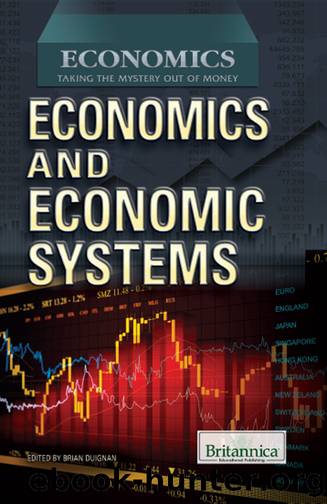Economics and Economic Systems by Britannica Educational Publishing

Author:Britannica Educational Publishing
Language: eng
Format: epub
Publisher: Britannica Educational Publishing
Published: 2013-09-15T00:00:00+00:00
FINANCIAL ECONOMICS
Although news about the stock market frequently dominates financial journalism, only since the late 20th century was the stock market recognized as an institution suitable for economic analysis. This recognition turned on a changed understanding of the âefficient market hypothesis,â which held that securities prices in an efficient stock market were inherently unpredictableâthat is, an investment in the stock market was, for all but insider traders, equivalent to gambling in a casino. (An efficient stock market was one in which all information relevant to the discounted present value of stocks was freely available to all participants in the market and hence was immediately incorporated into their buying and selling plans; stock market prices were unpredictable because every fact that made them predictable had already been acted on.) In the famous economistsâ joke, there is no point in picking up a $10 bill lying on the sidewalk, because if it were real, someone else would already have picked it up.
The growth of financial markets, the deregulation of international capital markets, and the unprecedented availability of financial data gradually undermined the efficient market hypothesis. By the 1990s there had been enough âbubblesâ in stock prices to remind economists of the excessive volatility of stock markets (and to prompt Federal Reserve Board chairman Alan Greenspan to point to the marketâs âirrational exuberanceâ when share prices hit new peaks late in the decade). The securities markets seemed anything but efficient, a fact demonstrated again in 2008, when the Dow Jones Industrial Average in the U.S. lost nearly 34 percent of its value during the international financial crisis that began in the previous year. In any case, finance is an area where facts can be highly ambiguous but where the number of people desperately interested in the nature of those facts will guarantee the further growth of financial economics.
Download
This site does not store any files on its server. We only index and link to content provided by other sites. Please contact the content providers to delete copyright contents if any and email us, we'll remove relevant links or contents immediately.
Hands-On Blockchain with Hyperledger by Nitin Gaur(1038)
Investment Banking For Dummies by Matthew Krantz & Robert R. Johnson(808)
Why Wall Street Matters by William D. Cohan(795)
The Creature From Jekyll Island: A Second Look at the Federal Reserve by G. Edward Griffin(654)
The Death of the Banker: The Decline and Fall of the Great Financial Dynasties and the Triumph of the Small Investor by Ron Chernow(642)
The House of Rothschild: The World's Banker, 1849-1999 by Niall Ferguson(624)
Street Fighters by Kate Kelly(614)
Lords of Finance: The Bankers Who Broke the World by Liaquat Ahamed(521)
Money, Power, and the People by Christopher W. Shaw(492)
Octopus by Guy Lawson(489)
Other People's Money and How the Bankers Use It by Louis D. Brandeis(488)
Organized Money by Keith Mestrich(479)
Modelling and Forecasting High Frequency Financial Data by Stavros Degiannakis & Christos Floros(464)
End the Fed by Paul Ron(463)
Among the Bankers by Joris Luyendijk(457)
Why I Left Goldman Sachs: A Wall Street Story by Greg Smith(443)
Bitcoin Basics: A Beginner's Guide to Bitcoin and Blockchain by Gordon Marc(439)
Lombard Street - A Description of the Money Market by Walter Bagehot(437)
Introduction to Takaful by Adnan Malik & Karim Ullah(433)
